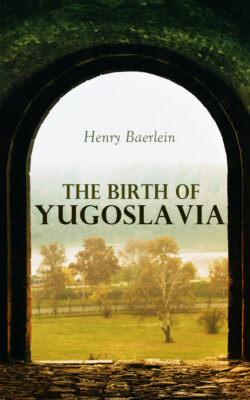Читать книгу The Birth of Yugoslavia - Henry Baerlein - Страница 60
На сайте Литреса книга снята с продажи.
DISASTER FOR NAPOLEON AND THE SOUTHERN SLAVS
Оглавление1813 was a fatal year for Napoleon and for this first attempt to build a Yugoslavia. It was a fatal year for the first effort to construct again a Serbian State. Burning with the hope of liberation, no less than four Serbian armies had assembled and advanced victoriously against the Turk. One of the most outstanding episodes was the heroic death of Stephen Sindjelinić at Tšegar, near to Niš. As he was in a hopeless case, no reinforcements having come, he told his men that they must die, but as the Turks outnumbered them so more of these must perish than of Christians. He waited till the Turks pressed closely round him and then fired the magazine. In vengeance for this deed the Turks piled up a pyramid of Serbian soldiers' heads; they called it Tchele-Koula (Tower of Skulls), and for many years it was at Niš a veritable Turkish monument. King Milan built a wall around it; afterwards it was removed. And so the Serbs continued their long fight. It seemed to some of them that the authority of Kara George had grown excessive. They convoked a national assembly, which decided to set up a Ministry of six and a tribunal. Kara George was—in agreement with his Ministers—to nominate the prefects of the various departments. While the Serbs were settling these internal matters, Russia made her peace in 1812 with Turkey. As for Serbia, it was arranged that the new fortresses would be demolished and the towns be occupied by Turkish garrisons. Thus all that Serbia had won, and at the cost of so much blood, would now be stolen from her. Once again did Kara George and his companions take the field, but this time they were overpowered. Many fled to Hungary, among them Kara George, and were imprisoned. Others stayed in Serbia, and of these a great many were slaughtered by the Turks. They say that sixty were impaled on each side of the road which enters Belgrade, among them priests and monks, whose bodies were consumed by dogs.
But Illyria and Serbia lived as inspirations.
Nearly thirty years after the Austrians came back to Illyria they, at the request of the Sultan, forbade the use of that name, except as one of their Emperor's string of titles. Turkish susceptibilities were not ruffled if he chose to call himself King of Illyria. Was he not also King of Jerusalem? There had been anxiety at Constantinople as to the effect which the name of Napoleon's province was producing on the Slavs of Bosnia. Considering the Austrian policy, this was not a glittering diplomatic triumph for the Turks. Had they approached the Austrians much earlier it is improbable that they would have been met with any very strenuous refusal. In their own phrase, a phrase that was used by Osman Pasha when he heard of the violent disputes between the Russians and Roumanians as to which of them had been the first to batter the defences down and take by storm the mighty Plevna—"Any pig," said he, "can walk in at an open door."
